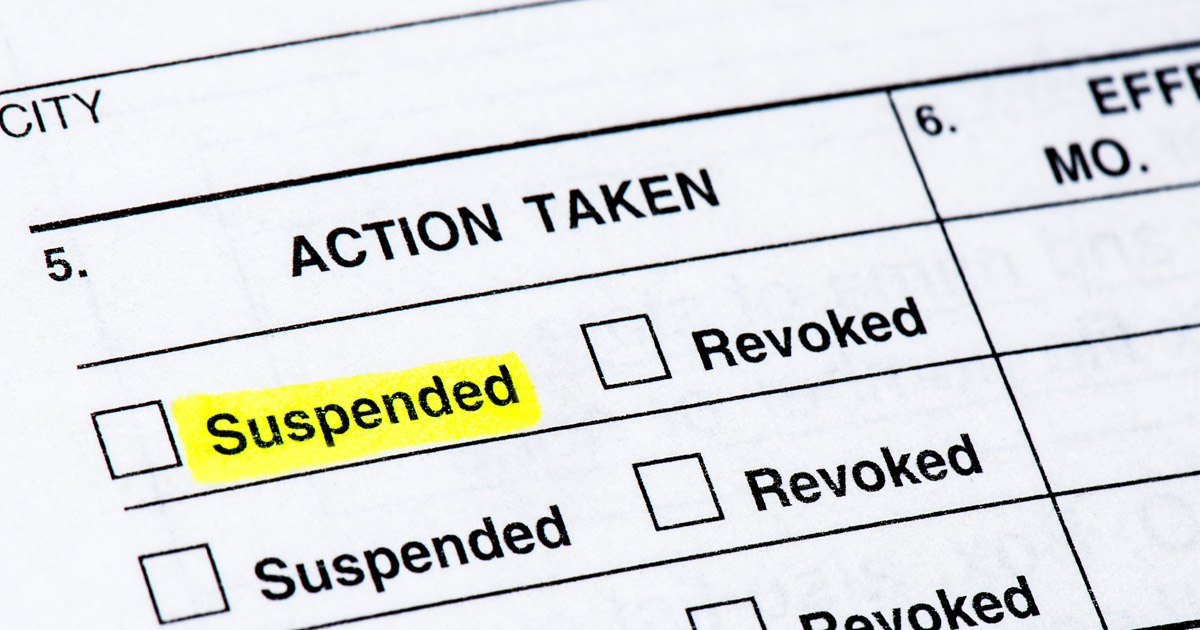What Should I Do After a Medical License Suspension?
January 14, 2021
When a physician has their medical license suspended, it means that the state’s medical board has ordered them to temporarily stop practicing medicine. To return to practice, the provider will need permission from the state medical board. A license suspension occurs when a provider fails to meet certain standards and criteria, and medical boards do this in order to protect the public.
A license suspension does not happen without some kind of event, accusation, or warning, and it should never be ignored. If a license suspension happens, it can lead to serious consequences for the provider.
What Leads to a Medical License Suspension?
A license suspension often starts from patient complaints or grievances from health care facility administrators. These concerns can be shared with the Federation of State Medical Boards (FSMB). This organization may investigate to determine if further action is necessary. The FSMB will look into accusations of professional misconduct, criminal activity, and malpractice; these can be alleged to have occurred inside and outside of the workplace. They may suspend a medical license based on any of these reasons or if they feel that sexual harassment, illegal drug prescriptions, crime convictions, alcohol and drugs abuse, and fraud have occurred.
Professional misconduct can include intentional or unintentional patient abuse. Unethical behaviors, like harassment and race discrimination, can also fall into this category. It is also not uncommon for doctors to have their licenses suspended for committing insurance fraud. A doctor who is being prosecuted for an alleged crime or has a prior conviction may have their license suspended if the conviction is related to a licensing issue.
The medical board may decide to put the practitioner on probation instead, which will last for a certain amount of time. The practitioner will be monitored regularly by the board to ensure that they are complying with the terms of the probation. The terms can vary, so the board’s order needs to be followed closely. The board may direct the practitioner to undergo psychiatric treatment, complete additional training, to stop performing certain procedures, or to only work under the supervision of another practitioner.
If a doctor fails to follow a probation or suspension order, it can lead to license revocation. Once a physician or health care provider’s license is revoked, their license to practice in the state is withdrawn, and they cannot practice medicine there.
Can I Request a Hearing?
Once the state medical board decides to suspend a physician’s license, they will mail the provider a letter to let them know the decision. There will be another document explaining the reasons for the suspension; there may also be fines that have to be paid. A provider who receives a license suspension notification from the state medical board has the right to a hearing, but this request must be made within 30 days of the notice; this date will be noted on the letter.
It is not always easy to get a medical board to overturn their decision through a hearing, but some physicians are successful in their attempts to do so. During a hearing, a provider can contest the board’s findings, but they will need solid evidence. The physician will need substantial medical information to support their claim, as well as detailed reasons for explaining their actions. An experienced lawyer can be helpful in this situation and might be able to request information from the medical board, including employment records and witness testimonies.
A few weeks after the hearing, the board should notify the doctor of their findings. They might end up changing their decision to suspend the license. If not, the board will keep their decision to suspend the license; when this happens, the physician may decide to appeal the board’s ruling.
How can I Appeal a License Suspension?
An appeal should be handled by a knowledgeable lawyer. A lawyer can work to develop a strong case to challenge the suspension, which could involve a private investigator, witness testimony, and medical experts. This case would then be presented to the board. If it is not successful, the physician might want to appeal to a higher court with an administrative judge. If the higher court rules in the physician’s favor, the medical board still has the option to overrule the decision.
If the board does not receive a hearing request, the suspension will move forward. When this happens, the physician must quit practicing medicine in the state or jurisdiction temporarily. An administrative investigation will then take place. After the investigation is completed or the board conditions are all met, the physician’s medical license might be restored.
Can My Medical License be Reinstated?
A medical license can be reinstated, but specific protocols must be followed, depending on the state of licensure. Once the suspension is over, there may also be a waiting period before reinstatement can be requested. To begin the process, the physician will need to complete and submit a reactivation application. There will be a question about whether or not the medical license was ever revoked or suspended. There will also be detailed instructions for completing the form, which must be followed.
In Pennsylvania, a reactivation application must be sent through the mail, although it can be accessed and printed online. Certain documents will also be necessary for completing the application. These may include proof of completing continuing medical education requirements and opioid and child abuse reporting education requirements. A National Practitioner Data Bank (NPDB) self-query report and current curriculum vitae, including the preceding 10 years or more, are also mandatory. To have a medical license reinstated, an applicant must also obtain professional liability insurance, and states do require minimum coverage amounts for this.
State medical boards may also require physicians to undergo clinical skills evaluations and retraining programs, especially when applicants have been out of practice for long periods of time, In Pennsylvania, this time period is generally four years. The license reactivation could be delayed until the evaluation and training are completed; these programs are provided by organizations. The board may also put certain conditions on the physician’s return to practice, which must be adhered to.
Licensure boards do charge renewal fees. There could be some additional nominal fees as well. An applicant may be contacted for additional information after the forms are received; discrepancy notices may also be mailed.
Philadelphia Physician Lawyers at Sidney L. Gold & Associates, P.C. Help Physicians with Medical License Issues
Becoming a physician or a licensed health care professional is a laborious process that requires years of hard work and dedication. Even the most respected practitioner can face a license suspension. A suspended or revoked medical license can cause great harm to a medical practitioner’s professional and personal life. To learn more about your options, do not hesitate to contact one of our Philadelphia physician lawyers at Sidney L. Gold & Associates, P.C. For a free consultation, contact us online or call us at 215-569-1999. Located in Philadelphia, we serve clients throughout Wilkes-Barre, Scranton, northeast Philadelphia, Bucks County, Chester County, Delaware County, and Montgomery County.




























